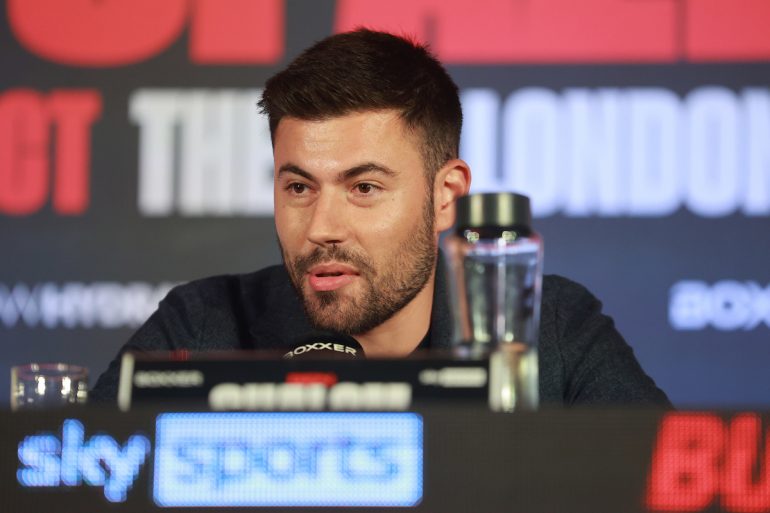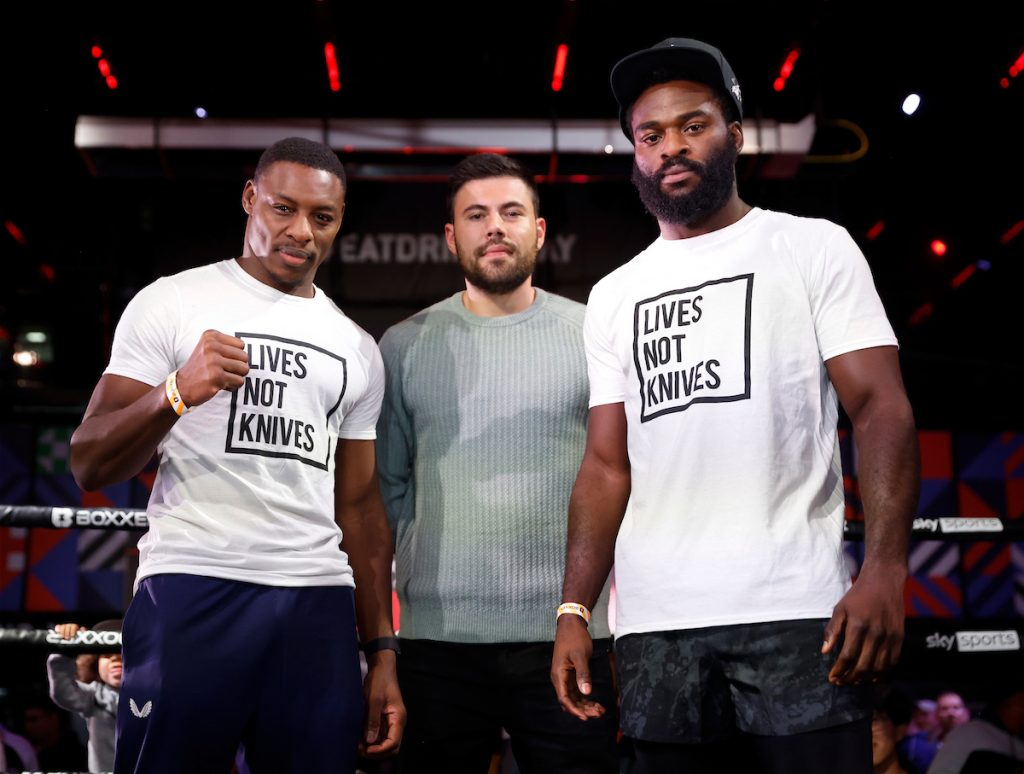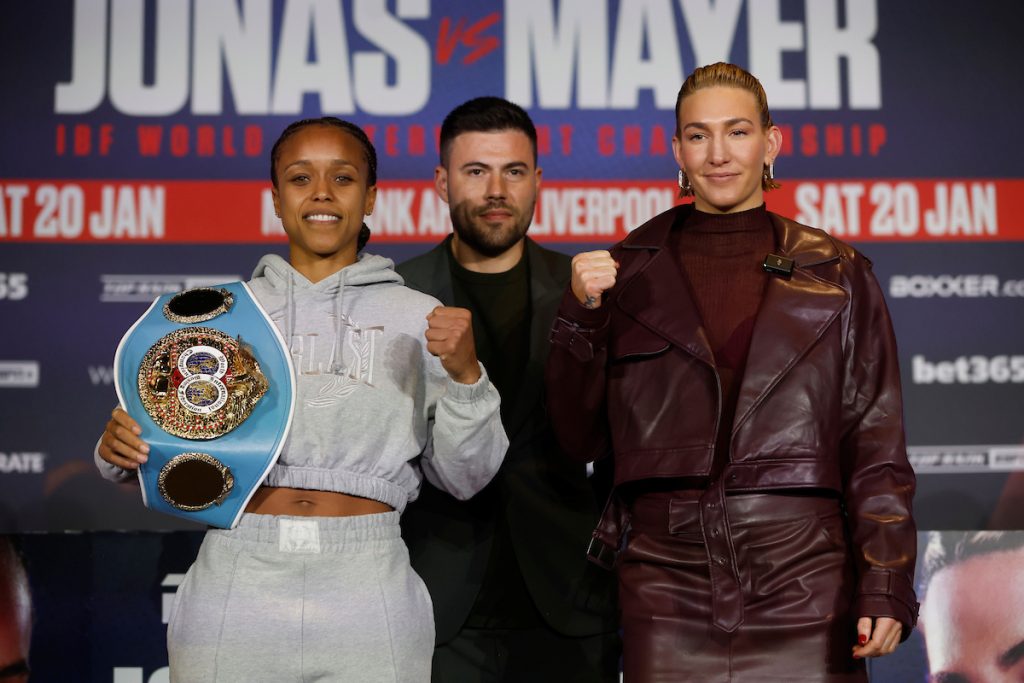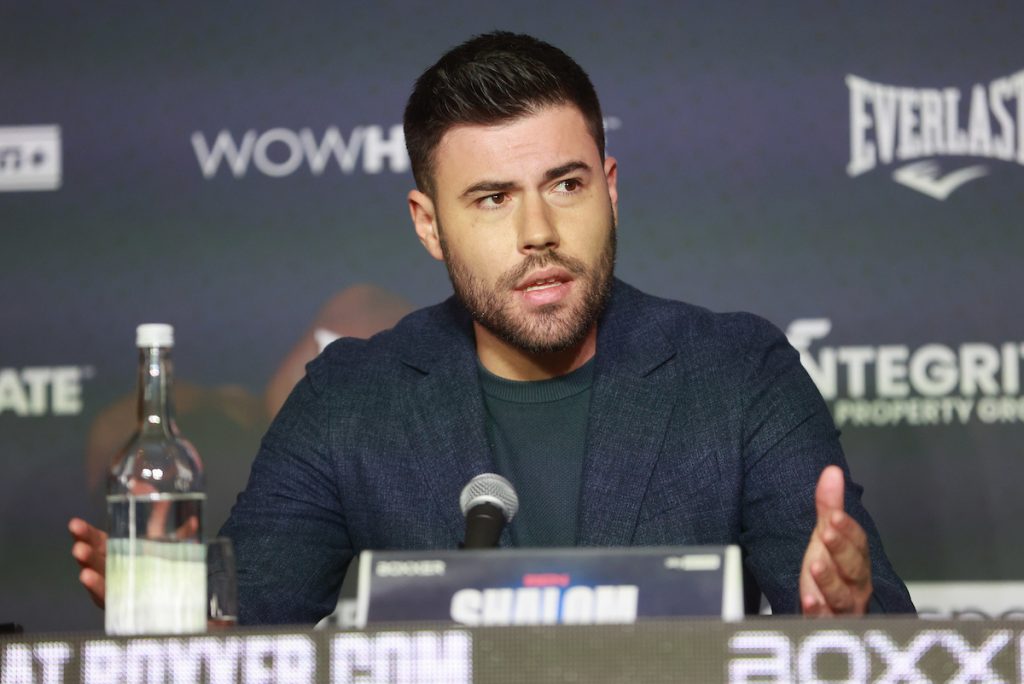Boxxer’s Ben Shalom discusses new deal with NBC/Peacock ahead of Buatsi-Azeez, and more

In recent years, boxing has seen more and more changes in its broadcasting and streaming landscape. New players arrive, traditional outlets close their doors to the sport, and it is oftentimes difficult to identify whether these changes are for the better.
But starting a new year with an established TV network in the US renewing its interest in the sport after a long hiatus is always good news, especially if it brings along a new streaming platform with an already growing sports viewership.
This is what happened with UK-based boxing promotional company Boxxer and their deal with US-based broadcasting giant NBC and their Peacock streaming service. In a year when long-time boxing broadcaster Showtime closed its boxing operations in the US and left many promoters scrambling for a new deal, Boxxer’s CEO Ben Shalom managed to land a game-changing deal for his company – and potentially for boxing as a whole.
“NBC is a giant in broadcasting, but one that’s been out of boxing for many years, and for many, many reasons,” said Shalom during our exclusive interview via Zoom. “You see a lot of broadcasters coming in and out of boxing in the US. Some come in, some leave. We’ve seen Showtime and HBO previously come out of boxing. The key is trying to make sure that the best networks want to have boxing on their platforms. That’s the biggest challenge. That’s what we had to do as our first step, trying to get boxing on NBC and their platform (Peacock).”
Shalom’s bet paid off, and his company’s debut in that new deal will start this Saturday with an intriguing light heavyweight clash between Joshua Buatsi (17-0, 13 KOs) and Dan Azeez (19-0, 13 KOs). They will meet at the OVO Arena Wembley in London on Saturday, February 3, and their 12-round battle will be streamed live on Peacock beginning at 2:00 p.m. ET.
“That one was supposed to happen back in October,” said Shalom about the fight, which is generating a lot of interest in the UK due to the backstory of both fighters being friends outside the confines of the ring. “it’s a huge fight here, between two fighters who know each other very well. So the story has grown and grown. Dan Azeez is only 21-years old, we think he’s going to be the next pay-per-view star. And then we have another show in early March, with Chris Billings-Smith defending his title against Richard Riakporhe. Here (in the UK) we’ll be doing one or two shows a month and every one of those shows will be on NBC. Ben Whitaker will be there, we think he’s going to be a huge star in the US. So for us is business as usual in the UK, but you’ll be able to see every single fight other than the co-promotions that we do occasionally with Top Rank, you’ll be able to see every single fight on NBC.”

Joshua Buatsi (right) and Dan Azeez (left) flank Boxxer CEO Ben Shalom (center) during a press conference to announce their clash at London’s 02 Arena – Photo by Lawrence Lustig/Boxxer
The deal will see Boxxer fight nights added to NBC Sports’ portfolio of sport programming, which includes the Olympic Games, Premier League, Sunday Night Football, Big Ten Football and Basketball, Notre Dame Football, NASCAR, golf and more.
Earning his boxing promoter’s license at the age of 23 gave Shalom a fresh view of a business to which many other competitors arrive at a later age with a large baggage of pre-conceived notions and other prejudices.
It is this fresh approach to the business, Shalom argues, what has enabled him to land this groundbreaking deal, among others.
“Promoters realize that more than the competition between themselves it’s the competition between networks,” said Shalom, who at 30 years of age remains one of the youngest promoters in the game. “All the networks want the best fighters on their platforms, and they find it very difficult. With other sports, whether it’s football or hockey or whatever, once they buy the sports package they know what they’re getting. This is a very different sport, one that’s very fluid, and it requires to make arrangements and requires flexibility. Every deal is different, and you hope that broadcasters will understand that. But it’s not easy.”
Aside from the unique challenges of getting a new broadcasting partner on board, there is always the upside of using their broader platform to engage fans outside boxing’s hardcore group of followers. And Shalom believes this new NBC/Peacock deal will give him the opportunity to do just that.
“They are a powerful and influential broadcaster in the US,” said Shalom, mentioning NBC’s involvement with such sports and entertainment brand. “The key for us is to bring another massive broadcaster into the sport and help them that way. A lot of people come into boxing and spend a lot of money and think they can take over, and it becomes a very difficult process. We want to grow in a strategic way, an incremental way. The traditional network model doesn’t always fit with how boxing needs to operate. That’s something we will hope for in the future. But first and foremost our focus is to get NBC excited about boxing.”
The initial run will feature, according to Shalom, Boxxer’s UK events being broadcasted in the US, and as those shows (which will necessarily be broadcasted in an evening time slot due to time zone differences) become established in the US and their brand also becomes visible, the idea is then to start attracting US-based talent to generate cards in America.
“You’ll start to see a lot of consistent shows on NBC, and you’ll start to see American elements introduced towards the back end of the year,” said Shalom, who kicked off 2024 with Natasha Jonas vs. Mikaela Mayer in January on ESPN in a co-promotion with Top Rank. “It’s definitely going to be a process. NBC has been out of boxing since 2016. With the new Peacock platform that they came up with, which is really successful, we want to understand their audiences from other sports, and understand how to grow boxing on that platform. And then we’ll look to increase our roster in the US.”
Shalom’s short but growing run as a promoter has seen him grow from his creative and innovative eight-man elimination ‘Ultimate Boxxer’ tournaments that were hugely successful and broadcast on ITV, Channel 5 and BT Sport, to some high-profile fights on Sky Sports, with the biggest to date being the all-UK domestic grudge match between Amir Khan and Kell Brook on February 2022.
Being a new kid on the block has also allowed him to go after the younger generations of fighters, currently having a solid roster of up-and-coming boxers including Adam Azim, Hughie Fury, Savannah Marshall, Claressa Shields, Caroline Dubois, Dan Azeez, Liam Smith and Frazer Clarke among others. And the feeling is mutual, since the newer generations are the ones that capture Shalom’s interest, demonstrated by his signing four out of the six Team GB medalists from Tokyo’s 2020 Olympic games.

Boxxer promoter Ben Shalom (center) is flanked by Natasha Jonas (left) and Mikaela Mayer (right) pose during the last press conference ahead of their bout – Photo by Lawrence Lustig/Boxxer
“Boxing needs superstars to survive and to thrive,” said Shalom, who feels he has signed a lot of the stars of the future, in the UK in particular. “With the younger talent, because we’re a younger business we feel that we understand them and we’re able to create a connection with them. We’ve had a huge success in signing the stars of the future. And that’s where we feel our sweet spot is, where we can grow a stable that is going to be extremely powerful. That’s what we want to continue, trying to find diamonds on the rough, so to speak. We do believe there’s a huge amount of talent around the world in boxing. But as you said, the stars, the TV-quality fighters, the names that bring in the subscribers, there aren’t enough of them. For us as promoters, for the benefit of the sport and of our business, it’s about creating the stars of the future. And that’s the focus for us right now.”
A quick look at Shalom’s roster reveals a particular interest in women’s boxing, a niche that is still developing and which, in many divisions, suffers from a dramatic shortage of fighters. And again, Shalom feels the future holds the answer to that problem.
“When Savannah Marshall and Claressa Shields became professionals, there were no superstars, and no one to look up to in women’s boxing,” said Shalom. “They broke through barriers and helped create a sport that wasn’t there. So naturally, there are not a lot of them now. But what I can say for sure is that their legacy we see it in the gyms, and in the amount of women taking up boxing in the amateurs. It is completely different to the women’s boxing scene when they were starting out. And that’s a legacy that they created. You are right, at the moment women’s boxing is still growing. We have Caroline Dubois, Lauren Price and Karriss Artingstall, those are three women that we signed from the Tokyo Olympics. That’s what makes me excited for the future. I can see the level of depth, I can see the talent. And now, those fighters can see a career for themselves in the sport. When Savannah Marshall and Natasha Jonas and Katie Taylor were starting, it wasn’t there. It was only a few select girls that were doing it for the love of the sport rather than a career that they could have to survive. Caroline Dubois and others are turning professional at 18 years old. When Natasha Jonas and Katie Taylor turned pro, they were in their 30s. Yes, at the moment the depth isn’t quite there, but I am very confident over the next three or four years that we are going to see a lot more from women’s boxing.”
Being the youngest promoter on the block gave Shalom the appeal and relatability that made his pitch more attractive to the younger generation of fighters, but he still had to move in a world populated by some of the longest-running dynasties in the world of sports. And that presented its own set of challenges.
“It’s been a close shop, especially in the US and the UK. It’s not every day that you have new promoters coming through,” said Shalom, reminiscing about his beginnings in the fight game. “The first challenge was trying to break into the market among the establishment. In the US you’ve got Bob Arum and Al Haymon, who have been running the sport for decades. It’s similar in the UK with the Hearns and the Warrens going back to the ‘70s and ‘80s. That’s the biggest challenge. Starting up a promotion to compete with great promoters who have been doing it for decades and decades. Having to convince everyone, whether it’s venues, whether it’s fighters, whether it’s broadcasters and sponsors and that you can do a job for them and that you can you can compete in the market.
“As with any established industry, breaking in is going to be difficult but more particularly in boxing. Everything is a challenge, from getting the licenses, signing young fighters, especially the best ones, the ones that have the choice of signing with any promoter, and convincing them of your vision for them and your vision for your promotional company. The biggest challenge I think for any boxing promoter is getting TV support and get networks to buy in to your business into your vision.”
Perhaps for that same reason is that Shalom has been heard repeatedly advocating for a more fluent communication between fellow promoters, with only a handful of them echoing his sentiments.
Learning that collaboration among equals is not exactly easy to achieve has been part of Shalom’s awakening into the subtleties of the sport.“A lot of people think they know how boxing works. But once you’re on the driver’s seat, you see why not many people have been able to break through and do it,” said Shalom. “It took us many shows with many broadcasters to get to our first major TV broadcaster, which was the Sky Sports contract. And that was when we were ready for the upper echelon of boxing promoters. That allowed us to get the budget to really grow and attract the fighters that we always dreamed of attracting. So, yeah, definitely getting TV networks is a massive challenge for any young promoter trying to break into the sport, something that we’ve managed to do successfully so far. You mentioned the NBC deal and that’s just that it will continuation of being able to grow. At the end of the day it is our job to provide the best platform possible for our fighters to fight.”

Boxxer CEO Ben Shalom – Photo by Lawrence Lustig/Boxxer
With a handful of collaborations already under his belt, Shalom hopes that the future will bring even more opportunities to network with fellow promoters.
“We worked with many promoters,” said Shalom, mentioning a long list of past collaborations, “I think it’s difficult because there has to be two parties who want to do that. The challenge has been gaining the respect of other promoters, getting them for one to collaborate, getting them to accept there’s a new player in the market as well, especially when they’re so few and they’ve almost had the run on it for so much for so long. So, I think we’re seeing now that it’s always best when promoters collaborate. I think our best work has come from collaborating with other promoters. I think maybe the older generations of the promoters always saw us as enemies, but this sport now it’s a globalized sport. There’s no language barrier. It’s a sport that’s growing, it’s a sport that needs to grow, it’s a sport where there’s so many talented fighters all around the world that should be looking to grow the sport together. And there’s so much room for growth in the sport. I think a lot of the younger people coming into those promotional companies and younger people coming into the sport recognize that, and I do think the tide is changing where promotes is seeing each other less as competitors and more as potential partners.”
As desirable as a healthy collaboration between promoters may be, there’s always the occasional colleague that takes it upon himself to warn his would-be competitors about the path that lays ahead of them. Shalom met one of such nemesis very early in his career, and his warning still resonates with him.
“I think it’s a bitter-sweet industry, and a bitter-sweet sport. The heights are very, very high, and the lows are very, very low,” said Shalom while reminiscing about fellow promoter Eddie Hearn’s prediction that Shalom would be facing ‘a life of aggravation and very little sleep’ in boxing if he chose to remain in the sport long enough. “There’s nothing more rewarding than working with phenomenal athletes, in the big shows, and developing and seeing their dreams come alive. Equally, it can be a horrible business. It can be a business that kicks you and hurts you, but it is also a business that is extremely rewarding. Many people would dream to be in my position. I am extremely grateful to be in the position I am in, and putting on shows with some of the fighters that I am working with and who I grew up watching. And sometimes you pinch yourself when you’re putting on a show with these big stars. The good outweighs the bad, and I pinch myself every day when I see that my company, from very humble beginnings, in Manchester, has become one of the biggest promoters in the world. It makes me very excited about the future as well.”
Diego M. Morilla has written for The Ring since 2013. He has also written for HBO.com, ESPN.com and many other magazines, websites, newspapers and outlets since 1993. He is a full member of the Boxing Writers Association of America and an elector for the International Boxing Hall of Fame. He has won two first-place awards in the BWAA’s annual writing contest, and he is the moderator of The Ring’s Women’s Ratings Panel. He served as copy editor for the second era of The Ring en Español (2018-2020) and is currently a writer and editor for RingTV.com.















